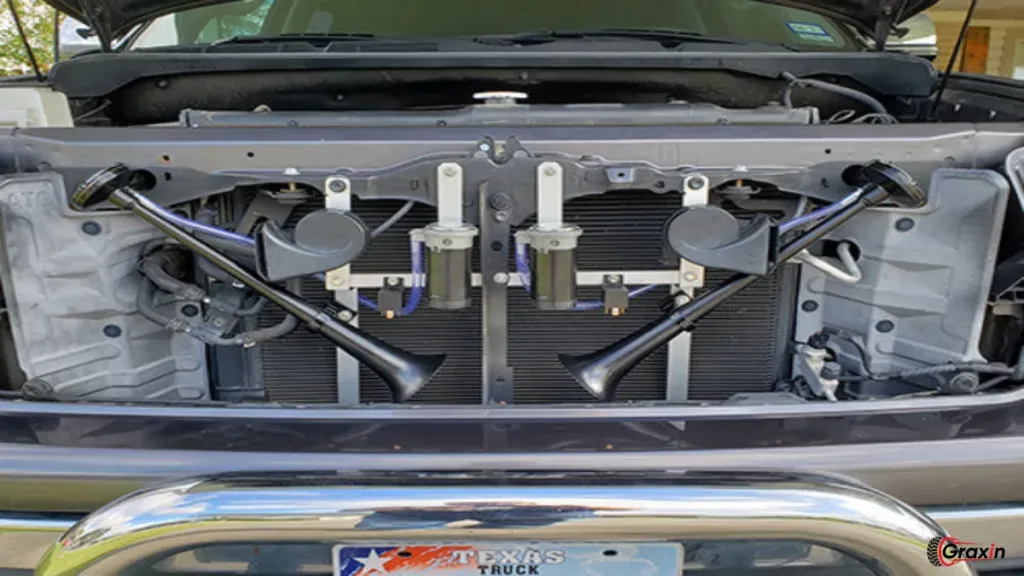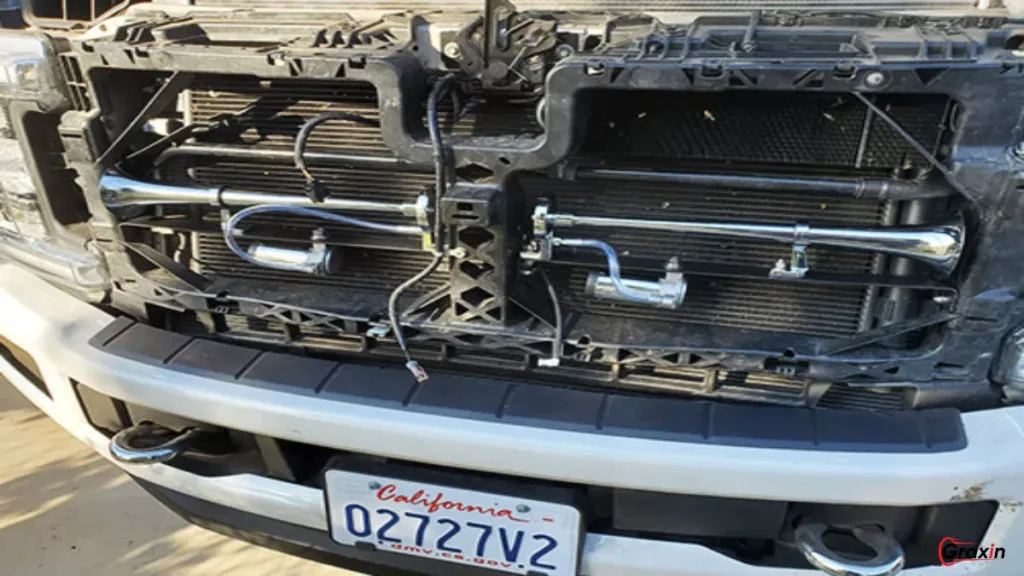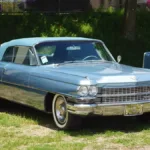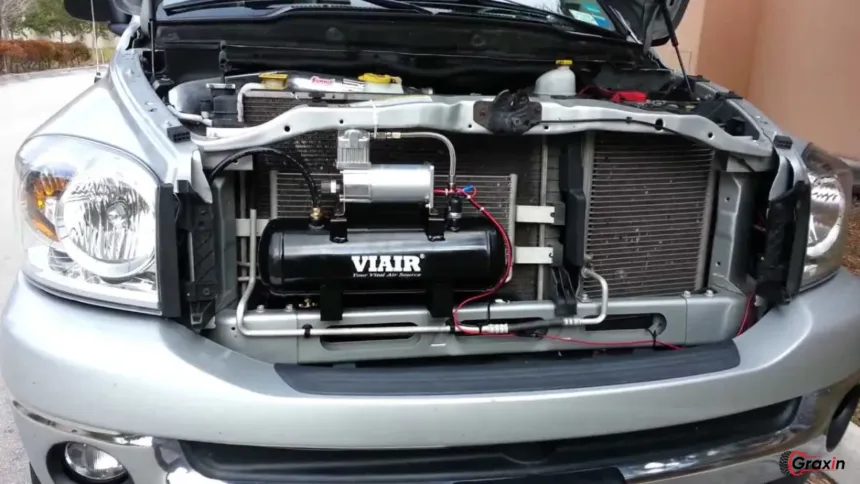It is well-nigh unmistakable the moment you hear the sheer thump of a truck’s air horn-it is very loud, attention-grabbing, and an absolutely indispensible tool on the road. Of course, however, air horns are more than noise producers-they play critical roles in safety, communication, and compliance. In this guide, we shall venture into what air horns are, why they are pertinent to trucks, how they work, and how to maintain them properly.
What is an Air Horn?
Essentially, the air horn is an appliance that produces a loud and high-pitched sound. It is installed in large vehicles, including trucks, buses, and emergency vehicles. Air compresses the device’s air that forces the diaphragm or reed found within the horn to vibrate, giving off the familiar noise often produced by horns.
The enormous size and massive weight put a truck in a risky situation of not being able to signal to other users at the road level; thus, it makes good use of air horns to alert other users about its presence, particularly in emergency situations or under poor visibility conditions. This way, the loudness of the horn is ensured, thereby guaranteeing the cutting of the noise of traffic at distances where a standard horn mi
Why Do Trucks Need Air Horns?

Safety First
The foremost safety reason is the primary use of air horns in trucks. Trucks are longer to stop, have bigger blind spots, and are more cumbersome to drive in compared with smaller vehicles. Standard car horns do not indicate enough to carry a driver’s message of trying to signal his presence or alert others of danger. An air horn, on the other hand, ensures that people within its range can be sure of its noise. It could be any car, pedestrian, or cyclist.
Communication on the Road
Beyond safety, the air horns work as a communication device. Truckers use them to alert other drivers, especially in areas with poor visibilities and bad weather. Whether it is a toot to alert that you are moving to another lane or a long bleat to alert others of an impending collision, the air horn is indispensible to truckers.
Compliance with Regulations
Most countries have in place the provisions that all commercial vehicles must be fitted with working air horns. The rules are laid down so that the trucks are fitted with the minimum safety devices to allow them to run along highways and city streets. Driving without a working air horn can lead to fines, penalties, or, worse, preventable accidents.
How Does an Air Horn Work?
Air horns in trucks operate through a simple yet effective system of compressed air. Here’s a basic breakdown:
- Compressed Air Supply: Trucks are equipped with air compressors that power various systems, including the brakes and air horn. Compressed air is stored in tanks until needed.
- Activation: When the driver presses the horn button, a valve opens, allowing compressed air to flow into the horn’s diaphragm.
- Vibration: The air causes a diaphragm or reed inside the horn to vibrate rapidly, producing sound waves.
- Amplification: The horn’s design amplifies these vibrations, creating the signature loud sound of the air horn.
The loudness of the air horn, typically measured in decibels, can range between 110 and 150 decibels. For context, a typical car horn is about 110 decibels, while an air horn at full blast can be as loud as a jet engine at takeoff.
Types of Air Horns for Trucks
Single-Trumpet Air Horns
These are the most basic type of air horn, featuring a single trumpet. While they’re simpler, they still provide plenty of noise and are common on smaller commercial vehicles or older trucks.
Dual-Trumpet Air Horns
Dual-trumpet horns are louder and produce a more harmonized sound. These are favored for larger trucks that need to cover greater distances with their warning sound.
Electric Air Horns
While traditional air horns use compressed air, electric air horns use an electric motor to force air into the horn. They’re generally easier to install but may not be as powerful as true pneumatic horns.
Train Horns
Some truckers opt for train horns, which are even louder than standard air horns and have multiple trumpets. However, these are typically reserved for off-road or show vehicles, as they’re louder than required for standard highway use.
Benefits of Installing High-Quality Air Horns
Improved Road Safety
A high-quality air horn provides a reliable, loud warning signal. When every second counts, having a robust air horn can make a life-saving difference.
Durability and Longevity
Investing in a durable air horn means it can withstand the wear and tear of daily trucking, as well as harsh environmental conditions like rain, dust, and extreme temperatures.
Customization
Some truckers choose to upgrade their air horns for aesthetic or functional reasons. Whether it’s adding multiple horns for a unique sound or choosing a model with stainless steel components for longevity, customization is a key benefit of high-quality horns.
How to Maintain Your Air Horn

Regular maintenance of your air horn ensures it stays in top condition, preventing sudden failures on the road. Here are a few tips:
Check the Air Supply
Ensure that the air compressor and tanks that supply the horn are functioning correctly. Low air pressure can result in a weak horn sound.
Clean the Trumpet
Dirt and debris can get lodged in the trumpet, especially after long trips. Regularly cleaning it prevents blockages that might dampen the sound or cause malfunction.
Inspect the Diaphragm
The diaphragm is the component that vibrates to produce sound. Over time, it can wear out, especially if exposed to harsh weather. Periodically inspect it for signs of wear and replace it if necessary.
Test the Horn Regularly
It’s essential to test the horn regularly to ensure it’s working as intended. A malfunctioning horn is a serious safety risk, especially for truck drivers who rely on it in emergency situations.
When Should You Replace an Air Horn?
Like any component of a vehicle, air horns don’t last forever. If you notice any of the following issues, it may be time to replace your air horn:
- Reduced Volume: If the horn sounds quieter than usual, it could indicate a blockage, failing diaphragm, or low air pressure.
- Inconsistent Sound: If the horn’s sound becomes irregular or distorted, it’s a sign that something is wrong internally.
- Air Leaks: Air leaks in the compressor or hoses can reduce the horn’s effectiveness, so inspect these parts regularly.
Replacing an air horn isn’t a complicated process, but it’s important to choose a replacement that fits your truck’s specifications.
Popular Air Horn Brands for Trucks
Wolo
Wolo is known for producing durable, reliable air horns with various designs and sound levels. Their models range from compact, single-trumpet horns to powerful multi-trumpet setups.
Hadley
Hadley horns are popular in the trucking industry for their high-quality materials and craftsmanship. Their horns are designed to withstand the elements while delivering consistent, loud sound.
Grover
Grover is another reputable brand, offering a range of air horns that are commonly found in commercial vehicles and even emergency vehicles. They focus on loud, clear sound, perfect for heavy-duty use.
Conclusion
The air horn is one of the essential parts of any truck’s safety system. Providing clear and loud signals to the drivers or pedestrians around, the air horn offers the truck user the difference between safety and disaster when cruising on heavy city traffic or highways. Having a bit of maintenance, proper installation, and the right choice of horn for the truck can lead to safe roads.
FAQs
1. Why do trucks have air horns?
Air horns provide a louder, more powerful signal than standard horns, which is crucial for warning other drivers and pedestrians, especially in emergencies.
2. How does an air horn work in a truck?
Air horns use compressed air to vibrate a diaphragm inside the horn, producing a loud sound. The air is supplied by the truck’s air compressor system.
3. How often should I maintain my truck’s air horn?
Regular maintenance should be done every few months, especially after long trips. This includes cleaning, inspecting the diaphragm, and checking the air pressure.
4. Can I install a train horn on my truck?
While it’s possible to install a train horn on a truck, be mindful of local noise regulations. Train horns are much louder than standard air horns and might be illegal for regular road use.
5. What should I do if my air horn stops working?
If your air horn stops working, check for blockages in the trumpet, inspect the diaphragm for wear, and ensure the air compressor is functioning properly. If none of these issues are the cause, it might be time to replace the horn.
Also Read: Why is Blue Smoke Coming from My Exhaust?







